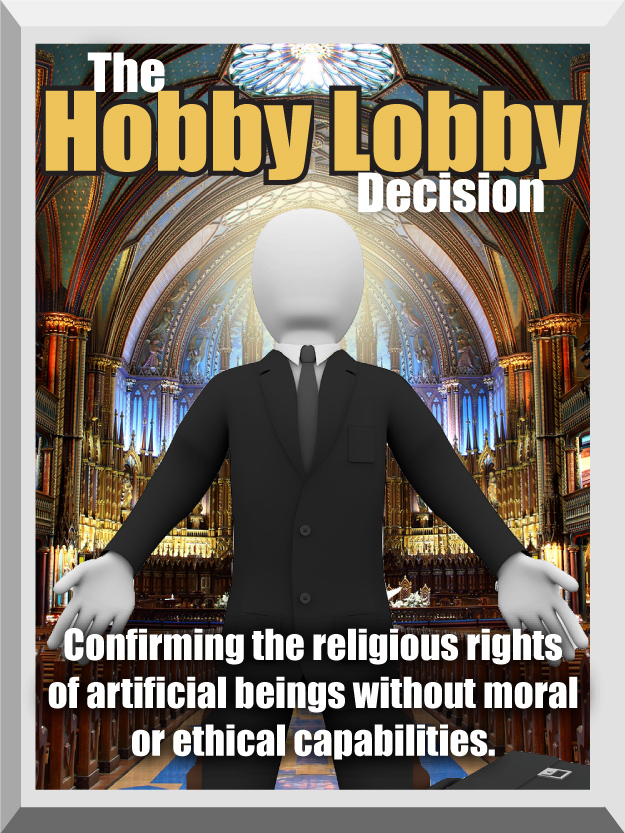 “News To Make You Furious” isn’t designed to raise your blood pressure just for the sake of it. We try not to bring you a list of outrages for the sake of outrage; we try to find things you may not have been aware of, or things that you can take action on immediately. Unfortunately, although the recent Supreme C
“News To Make You Furious” isn’t designed to raise your blood pressure just for the sake of it. We try not to bring you a list of outrages for the sake of outrage; we try to find things you may not have been aware of, or things that you can take action on immediately. Unfortunately, although the recent Supreme C ourt Hobby Lobby decision is something everyone’s aware of and there’s not a damn thing any of us can do about it, it was the only subject that made sense for this month’s Furious. We were not alone in being appalled by the case that elevated the long-overlooked religious rights of corporations over the gratuitous healthcare of humans. There are so many ways this decision was abusive, but it boils down to this… humans’ healthcare, which could be both carrot and stick, is now in the hands of unaccountable and ultimately powerful legal constructs with no ethical restrictions and profit as their only standard of good. For people who respect democratic values enough to not force religious values on others it’s yet another iron-clad argument for Single Payer health care, among other things. For all of us, it may be more than a reason to be Furious… it may be a reason to be scared.
ourt Hobby Lobby decision is something everyone’s aware of and there’s not a damn thing any of us can do about it, it was the only subject that made sense for this month’s Furious. We were not alone in being appalled by the case that elevated the long-overlooked religious rights of corporations over the gratuitous healthcare of humans. There are so many ways this decision was abusive, but it boils down to this… humans’ healthcare, which could be both carrot and stick, is now in the hands of unaccountable and ultimately powerful legal constructs with no ethical restrictions and profit as their only standard of good. For people who respect democratic values enough to not force religious values on others it’s yet another iron-clad argument for Single Payer health care, among other things. For all of us, it may be more than a reason to be Furious… it may be a reason to be scared.
The Hobby Lobby Decision: A Summary & Explanation
Libby Anne, Patheos
There is a lot of ruckus about Hobby Lobby today, and I’ve already seen multiple sources providing inaccurate summaries about what happened. So in an effort to summarize in one place what the decision did and did not do, I decided to do the rare act (for me) of posting a Facebook note. I’ll try to provide a lot of background info so those who haven’t been following the case are brought up to speed. If you want to read the decision yourself, it is here. The Hobby Lobby case is really two cases heard together: Burwell v. Hobby Lobby and Conestoga Wood v. Burwell. Burwell is the Secretary of the Dep’t of Health and Human Services (HHS). When you sue the government for an alleged violation of your constitutional rights, you typically name a specific official who heads the government agency or department that is doing the violation.
Ruth Bader Ginsburg Was Right, and We Already Have Proof
Zoe Carpenter, The Nation
Among the many questions raised by the Supreme Court’s ruling in Burwell v. Hobby Lobby is how sweeping its legacy will be. Supporters of the decision have insisted that the ruling is “narrow,” as it explicitly addresses “closely held” corporations objecting to four specific types of birth control—including IUDs and Plan B—because the business’ owners consider them (inaccurately) to cause abortion. Besides, the Court argued, the government can just fill any coverage gaps itself, and it’s only women whom corporations are now permitted to discriminate against. “Our decision in these cases is concerned solely with the contraceptive mandate,” claimed Justice Samuel Alito, writing for the majority. “Our decision should not be understood to hold that an insurance-coverage mandate must necessarily fall if it conflicts with an employers’ religious beliefs.”
Where Will the Slippery Slope of ‘Hobby Lobby’ End?
Katha Pollitt, The Nation
Facts are stubborn things, as John Adams famously said. Unless, that is, you’re talking about religion. Then facts don’t seem to matter at all: right you are if you think you are. The Hobby Lobby case was billed as a test of religious freedom versus the power of the state: Did the Religious Freedom Restoration Act (RFRA) mean that David Green, the evangelical Christian CEO of a chain of crafts stores, could be exempt from providing coverage for the full range of contraceptives for his employees under the Affordable Care Act? Green balked at including Plan B, Ella (another form of emergency contraception) and two kinds of IUD, because, he claimed, they caused “abortion” by preventing the implantation of a fertilized egg.
Legal Experts, Advocates React to Supreme Court’s Hobby Lobby Ruling
Wall Street Journal Law Blog
Politicians React To The Supreme Court’s Hobby Lobby Decision
Alex Lazar, Huffington Post
How the Nation’s Biggest Closely Held Corporation Reacted to Hobby Lobby
Kia Makarechi, Vanity Fair
ANALYSIS: Judge Napolitano, Sekulow React to Successful Challenge to ObamaCare
FOX News Insider
Post-Hobby Lobby, Religious Orgs Want Exemption From LGBT Hiring Order
Dylan Scott, Talking Points Memo
The day after the Supreme Court’s Hobby Lobby ruling, a group of religious leaders sent a letter to President Barack Obama asking that he exempt them from a forthcoming executive order that would prohibit federal contractors from discriminating against LGBT people.
The letter, first reported by The Atlantic, was sent on Tuesday by 14 representatives, including the president of Gordon College, an Erie County, Pa., executive and the national faith vote director for Obama for America 2012, of the faith community.
“Without a robust religious exemption,” they wrote, “this expansion of hiring rights will come at an unreasonable cost to the common good, national unity and religious freedom.”
SC Restaurant Owner Refuses To Serve Blacks, Cites Religious Beliefs
Manny Schewitz, Forward Progressives
In South Carolina, a BBQ restaurant owner claimed that he was within his rights to refuse service to blacks based on his religious beliefs. In the case brought before the Supreme Court, Maurice Bessinger stated that his religion required him to keep black people from eating in his restaurant, although he was perfectly OK with taking their money, so long as they ordered their food to-go. The attorney representing the petitioners suing Piggie Park also addressed in court the “First Amendment religious privilege claim that petitioner asserted that his religion required him” to deny service to black customers. “I’m just a fair man. I want to be known as a hard-working, Christian man that loves God and wants to further (God’s) work throughout the world as I have been doing throughout the last 25 years.”
Could Supreme Court contraceptive ruling affect coverage of vaccines and blood transfusions?
Steve Contorno, PolitiFact.com
First birth control, next blood transfusions? That’s an argument many progressives and abortion-rights groups are making in the wake of the Supreme Court decision in Burwell vs. Hobby Lobby. In a narrow 5-4 decision Monday, the high court said that closely held corporations with strong religious convictions don’t have to offer insurance that covers four kinds of contraceptives mandated by the Affordable Care Act. While the opinion, written by Justice Samuel Alito, was narrowly tailored to only apply to the cases before the court, others warned of a slippery slope. “Today it’s birth control,” said NARAL Pro-Choice America president Ilyse Hogue in a statement. “Tomorrow it could be any personal medical decision, from starting a family to getting life-saving vaccinations or blood transfusions.” Indeed, even the justices bickered over the scope of the decision.
Here Are the 82 Companies That Think Birth Control Is Murder
Erin Gloria Ryan, Jezebel
Yesterday, a five conservative Catholic dude majority (yes — Scalia, Roberts, Alito, Thomas, and Kennedy are all Catholic) on the Supreme Court sided with Hobby Lobby in a case that sought to establish whether certain corporations could be said to hold “religious beliefs” and whether being compelled to providing an insurance plan that furnished contraception to female employees who needed it would constitute a violation of those corporate beliefs. But the decision was much bigger than just Hobby Lobby and Conestoga Wood Products. Here are the 82 other companies that believe — contrary to scientific evidence — that certain forms of birth control are the same as abortion and that abortion is the same as murder.
The Daily Beast’s Abby Haglage did some impressive legwork in assembling this list of 82 other companies — some for profit, others nonprofit — that have mounted challenges to Obamacare’s so-called “contraception mandate” and that now stand to apply to be exempt from providing certain non-abortion reproductive health care options to their female employees. Because God has apparently Taken A Stand when it comes to IUDs, and he only told dudes and the Pope about it, since IUD’s weren’t invented until the Bible was more than 2,000 years old.
Does a Christian White-Supremacist Business Have the “Religious Freedom” to Discriminate?
Chauncey DeVega, AlterNet
The slide towards American theocracy was nudged one more step forward by the Supreme Court decision in support of the “freedom” of corporations with “religious” beliefs to restrict the rights of their employees. In essence, religious “beliefs” trump the obligations, rights, and responsibilities that come with being members of the polity and a broader political community. The NY Times details the logic of the theocrats as: “The 5-to-4 decision, which applied to two companies owned by Christian families, opened the door to challenges from other corporations to many laws that may be said to violate their religious liberty. Justice Samuel A. Alito Jr., writing for the court’s five more conservative justices, said a federal religious-freedom law applied to for-profit corporations controlled by religious families. He added that the requirement that the companies provide contraception coverage imposed a substantial burden on the companies’ religious liberty. He said the government could provide the coverage in other ways.”
It Begins: Lawyers For Gitmo Detainees Invoke Hobby Lobby Ruling In Court Filing
Samuel Warde, Liberals Unite
Justice Ruth Bader Ginsburg warned that “The court, I fear, has ventured into a minefield” in her blistering dissent to the Supreme Court’s 5-4 ruling in the Hobby Lobby case. A mere three days later, lawyers representing two Guantanamo Bay detainees have filed motions asking a federal court to block officials from preventing them from taking part in communal prayers during the holy month of Ramadan. The lawyers are arguing that the detainees rights are protected under the Religious Freedom Restoration Act in light of the recent ruling in Burwell v. Hobby Lobby Stores, Inc. Al Jazeera English reports: “The motions were filed this week with the Washington D.C. district court on behalf of Emad Hassan of Yemen and Ahmed Rabbani of Pakistan. U.K.-based human rights group Reprieve said both men asked for the intervention after military officials at the prison ‘prevented them from praying communally during Ramadan.’”
Fact Checker: Democrats on Hobby Lobby: ‘Misspeaks,’ ‘opinion’ and overheated rhetoric
Glenn Kessler, Washington Post
“Really, we should be afraid of this court. The five guys who start determining what contraceptions are legal. Let’s not even go there.”— House Minority Leader Nancy Pelosi (D-Calif.), at her weekly news conference, on July 10
In the wake of the Supreme Court’s 5-to-4 ruling that, as a closely held company, Hobby Lobby was not required to pay for all of the birth-control procedures mandated by the Affordable Care Act, Democrats have rushed to condemn the court. But in some cases the rhetoric has gotten way ahead of the facts. Here’s a round-up of some of the more noteworthy claims. In some cases, lawmakers concede that they make a mistake; in others, they are argue that they are offering what amounts to opinion, even though the assertion was stated as fact…
If Christian Corporations Have Religious Rights, What About Muslim Prisoners?
Zoe Carpenter, The Nation
If corporations have religious rights that warrant protection under the law, why don’t men imprisoned at Guantánamo Bay? A federal judge has given the US government until Tuesday evening to answer that question, which was posed by lawyers representing two Guantánamo detainees, Emad Hassan and Ahmed Rabbani, who have been held without charge or trial. Authorities at the prison have barred the two men from communal prayers during the holy month of Ramadan because they are on hunger strike. Two courts ruled previously that Hassan and Rabbani are not people, at least “within the scope” of the Religious Freedom Restoration Act, which prevents the government from substantially burdening a person’s freedom to exercise religion.
In last week’s Hobby Lobby v. Burwell decision, the conservative majority of the Supreme Court ruled that the chain of craft stores, along with other closely held corporations, are within the scope of the RFRA. Three days later, lawyers representing the detainees filed new lawsuits calling on a DC circuit court to restore the detainees’ right to communal prayers in light of the High Court’s interpretation.
Analysis: Hobby Lobby beat the contraception mandate. Here’s why the nuns may not
David Gibson, Religion News Service
When the Supreme Court on Monday (June 30) issued a split decision narrowly backing the right of for-profit corporations to deny contraception coverage to their employees for religious reasons, many assumed that faith-based nonprofits would have it easy when their own cases eventually reach the high court. “The death knell is sounding for the HHS mandate,” said Lori Windham, an attorney at the Becket Fund for Religious Liberty, which is representing the Little Sisters of the Poor, an order of nuns, as well as other religious groups that object to the Health and Human Services Department policy requiring birth control coverage. Windham noted that in two rulings by lower courts on Monday, several of Becket’s faith-based clients received last-minute relief to shield them from complying with the mandate, which takes effect today (July 1). “The ruling in Hobby Lobby and then these two rulings in quick succession show that the HHS mandate is on its last legs when it comes to religious nonprofits,” Windham said. Yet many analysts say that in fact what worked for Hobby Lobby — the national craft store giant owned by the Green family, who are evangelical Christians — may not necessarily work for the Little Sisters, who operate nursing homes for the poor around the country.
Analysis: Hobby Lobby and claims for religious exemptions from anti-discrimination laws?
Kevin Russell, SCOTUS Blog
The Court’s decision in Hobby Lobby takes pains to emphasize that it is resolving only the dispute before it, but the principles it has adopted will have an obvious impact in other kinds of religious freedom claims in other contexts. One area discussed briefly by both the majority and dissent is discrimination in employment and public accommodations.
There are numerous state or federal laws that prohibit business from discriminating against employees (and potential employees) or their customers on various grounds, including race, sex, religion, disability, familial status, and, more recently, sexual orientation. Some business owners object to those laws on religious grounds. If the Religious Freedom Restoration Act (RFRA) requires giving Hobby Lobby a religious exemption from the contraceptive mandate of the Affordable Care Act, does it also provide other businesses with a defense against civil rights laws prohibiting discrimination?
8 Other Laws That Could Be Ignored Now That Christians Get To Pick And Choose
Ryan Grimm, Huffington Post
The owners of a chain of stores called Hobby Lobby don’t like Obamacare. In particular, they really don’t like the part that requires insurance companies to cover contraceptives. Normally, people who don’t like a law petition the government to change that law. That’s how a nation of laws works.
But these men are Christians. The Supreme Court ruled Monday that Christian business owners are special. Their deeply held religious belief that some particular form of contraception is immoral carries more weight than the force of law, five conservative Christian justices ruled. The court — in a fairly bald admission that its ruling is incoherent — added that no general amnesty from other laws should be assumed to be the result of its ruling and that its reasoning was strictly limited to women’s contraception. Such a limitation raises legitimate questions about the rather perverted and obsessive minds of the five men who made the ruling, but it also carries little legal weight. Precedent is precedent, whether the precedent-setters say so or not.
A Ruling That Both Sides Can Run With
Jeremy Peters and Michael Shear, New York Times
WASHINGTON — The Supreme Court’s ruling on Monday that the government cannot force certain employers to pay for birth control was more than a rebuke to President Obama. It was vindication of the conservative movement’s efforts to chip away at laws it finds objectionable by raising questions of freedom of expression. The decision — like several recent rulings from the justices and lower courts involving prayer at town meetings and protests outside abortion clinics — carved out a significant, albeit narrow, legal exception in the context of a broader cultural fight that social conservatives have been unable to win outright.
The Bait-And-Switch Behind Today’s Hobby Lobby Decision
Ian Millhiser, Think Progress
For many years, the Supreme Court struck a careful balance between protecting religious liberty and maintaining the rule of law in a pluralistic society. Religious people enjoy a robust right to practice their own faith and to act according to the dictates of their own conscience, but they could not wield religious liberty claims as a sword to cut away the legal rights of others. This was especially true in the business context. As the Supreme Court held in United States v. Lee, “[w]hen followers of a particular sect enter into commercial activity as a matter of choice, the limits they accept on their own conduct as a matter of conscience and faith are not to be superimposed on the statutory schemes which are binding on others in that activity.”
With Monday’s decision in Burwell v. Hobby Lobby, however, this careful balance has been upended. Employers who object to birth control on religious grounds may now refuse to comply with federal rules requiring them to include contraceptive care in their health plans. The rights of the employer now trump the rights of the employee.
Micah Schwartzman, Richard Schragger, and Nelson Tebbe, Slate.com
Monday’s decision in Hobby Lobby was unprecedented. Much of the commentary has focused on the Supreme Court’s decision to extend rights of religious free exercise to for-profit corporations. Hobby Lobby is for religion what Citizens United was for free speech—the corporatization of our basic liberties. But Hobby Lobby is also unprecedented in another, equally important way. For the first time, the court has interpreted a federal statute, the Religious Freedom Restoration Act (or RFRA), as affording more protection for religion than has ever been provided under the First Amendment. While some have read Hobby Lobby as a narrow statutory ruling, it is much more than that. The court has eviscerated decades of case law and, having done that, invites a new generation of challenges to federal laws, including those designed to protect civil rights.
Hobby Lobby is one of the most dangerous Supreme Court decisions ever, and here’s why
Aaron James Spencer, Essayworks
Burwell v. Hobby Lobby is one of the most dangerous Supreme Court decisions ever, and we are already seeing why. The ruling misinterprets religious freedom in the United States, restricts the rights of women everywhere, raises religious belief above medical and scientific fact in lawmaking, and is easily expandable to accommodate the religious objections of a host of corporation owners. On the final day of the October 2013 term, the Supreme Court handed down the decision in the Hobby Lobby case, exempting closely held, for-profit corporations from any law to which they have a religious objection, provided there is a less restrictive way for the government to achieve the law’s aim.










